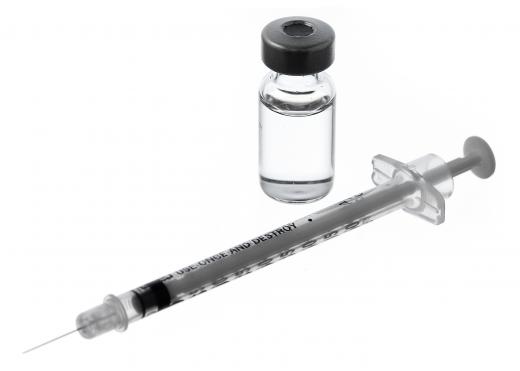What is Immunopharmacology?
Immunopharmacology is the intersection of immunology and pharmacology. This research and medical science specialty focuses on drugs that affect the immune system, whether to suppress it, activate it, or manipulate it in some way. The most well-known immunopharmacology agents include anti-rejection drugs and vaccines.
The basis of immunopharmacology is the immune system itself, a highly diverse and complex system which comprises a very long list of cells, hormones, and other chemical signaling molecules. The immune system can be categorized in a number of different ways, including the innate and adaptive, the passive and active, and the cellular and antibody response. All of these various different categories can be targeted by immunopharmacology to produce new treatments and medications to help treat disease, or simply to increase scientific knowledge in the field.

There are two general classes of immunotherapeutic drugs. Those which stimulate or activate the immune system are termed immunostimulants, while those which suppress the immune system are immunosuppressants. Each class of drug is useful in certain specific situations and immune disorders.
Immunostimulants are drugs which can be used to stimulate the immune system. In addition to drugs themselves, several vitamins, minerals, and other chemicals are known to boost the efficacy of the immune system. While immunosuppressant drugs have been studied more extensively than immunostimulants, this latter class of therapeutic agents has so far shown some promise in the treatment of primary immunodeficiencies and cancers as well as HIV and AIDS. Vaccines and adjuvants are also classed as immunostimulants.

Another section of immunopharmacology deals with immunosuppressant medications. These are used to suppress the immune system to prevent rejection of transplanted organs and to treat autoimmune diseases such as rheumatoid arthritis and lupus. In both cases, the immune system itself causes damage to the body and must be actively suppressed using drugs to prevent further damage. New treatments are constantly under evaluation due to the side effects of such drugs. Immunosuppressants are not specific, meaning all immune system activity is suppressed, and a person taking such drugs is rendered extremely vulnerable to all types of infection.

Immunopharmacological research is not only limited to the discovery of new drugs. Research is also dedicated to examining how the immune system functions with a view to discovering new drug targets. For example, research which examines chemical signaling mechanisms between immune cells might provide one or more therapeutic targets for treatment that interferes with chemical signals between specific types of immune cells.
AS FEATURED ON:
AS FEATURED ON:















Discussion Comments
There are many folks who seem to feel that those working in immunopharmocology have advancements far beyond what they are actually letting the average Joe know about.
I’m not really exactly sure about my stance regarding this, but I can say that I absolutely hope that mankind is in a better state than that. I will also say, conversely, that it really wouldn’t surprise me if that were the case at all.
Basically, the people who make these sorts of claims against pharmaceutical companies are implying that the companies realize if they release, say, a cure for cancer that they are actually putting themselves out of a lot of money.
I have wondered myself many times if this might not be the very case because every once in a while you’ll hear something along the lines of a cure being found for the common cold and how that could lead to a cure for AIDS.
Then suddenly, it seems as though all of the information just disappears and you never hear from it again.
I think that the possibilities that come from immunopharmocology are immense and absolutely awe inspiring. The people who work in this field must really have their heads on the right way.
They must also have nerves of steel. Could you imagine holding people’s immune systems in your hands, and the consequences that could be wrought if you make a wrong move?
We see all of the time where drug companies are recalling drugs that have turned out to be not as safe as they thought. I would absolutely rue being the person or persons who had run the trials that said that drug was safe.
These people certainly have an inspirational career path, but also one where a strong countenance is definitely required.
Post your comments